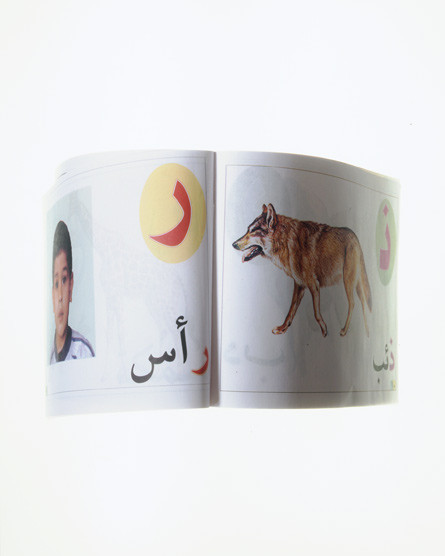Jean-Luc Moulène
03 - 21 Sep 2007
JEAN-LUC MOULÈNE
For its annual September project, Thomas Dane Gallery is pleased to present Jean-Luc Moulène’s ‘Products of Palestine’ series of photographs in its entirety for the first time.
French artist Jean-Luc Moulène photographed his ‘Products of Palestine’ (Produits de Palestine) series between April 2002 and November 2004. He selected 58 consumer products from the occupied territories of the West Bank and Gaza Strip which don’t circulate as part of the world market due to imposed sanctions. Moulène appropriates the visual codes of advertising by photographing the products (mainly foodstuffs and domestic items such as boxes of pills, soap, and tape cassettes) in natural light against a stark white or yellow monochrome background. By making these products manufac-tured in Palestine visible through their systematic documentation, Moulène is high-lighting their invisibility and lack of presence in the global economy.
Moulène first displayed four of these products at the Sorbonne’s University art gallery in May 2002. Photographs of packets of almonds, couscous and bottles of olive oil are each depicted in multilingual, branded packaging, flagged as ‘Fair trade’, the rare items circulated by Oxfam. This was the starting point for the sober cataloguing of bottles of water, tins of tomatoes, bags of coffee, beer and even lingerie. Certain products the artist has selected make more cynical statements than others; the cigarette packet branded ‘Welcome’, for example, akin to a road sign that greets one at the border of a new city, becomes a loaded invitation since it is only the inhabitants of occupied land who have access to the product and brutally highlight the issue of a place that lacks sovereignty while at the same time is not considered part of Israel.
For the majority of images, Moulene deliberately pairs two of the same product: two packets of Jerusalem chocolate wafers side by side, building a wall; two bottles of olive oil, one standing upright, the other lying on its side; a couple of olives, one green, the other black seemingly approaching each other across an invisible divide. With this game of proximity, equivalence and oppositions the artist subtly makes visible the par-tition.
These very ordinary, quotidian objects, though suppressed and negated by geo-political circumstances, are granted recognition anew at their point of export into the alternative economy of the art market. Jean-Luc Moulène's photographs of the goods become artistic products in free circulation.
Editors Notes
Jean-Luc Moulène was born in Reims in 1955, studied Literature and Philosophy at the Sorbonne University and graduated as an professor, and currently lives and works in Paris. Recent and notable exhibitions include: Musee d’Art Moderne de la Ville de Paris, 1997. Documenta X, Kassel in 1999. Sao Paulo Bienal in 2003. Centre National de la Photographie, Paris, 2003. Jeu de Paume, Paris, 2005. Le Louvre, Paris, 2006. His first solo show in London was here at the Thomas Dane Gallery in June 2006.
For its annual September project, Thomas Dane Gallery is pleased to present Jean-Luc Moulène’s ‘Products of Palestine’ series of photographs in its entirety for the first time.
French artist Jean-Luc Moulène photographed his ‘Products of Palestine’ (Produits de Palestine) series between April 2002 and November 2004. He selected 58 consumer products from the occupied territories of the West Bank and Gaza Strip which don’t circulate as part of the world market due to imposed sanctions. Moulène appropriates the visual codes of advertising by photographing the products (mainly foodstuffs and domestic items such as boxes of pills, soap, and tape cassettes) in natural light against a stark white or yellow monochrome background. By making these products manufac-tured in Palestine visible through their systematic documentation, Moulène is high-lighting their invisibility and lack of presence in the global economy.
Moulène first displayed four of these products at the Sorbonne’s University art gallery in May 2002. Photographs of packets of almonds, couscous and bottles of olive oil are each depicted in multilingual, branded packaging, flagged as ‘Fair trade’, the rare items circulated by Oxfam. This was the starting point for the sober cataloguing of bottles of water, tins of tomatoes, bags of coffee, beer and even lingerie. Certain products the artist has selected make more cynical statements than others; the cigarette packet branded ‘Welcome’, for example, akin to a road sign that greets one at the border of a new city, becomes a loaded invitation since it is only the inhabitants of occupied land who have access to the product and brutally highlight the issue of a place that lacks sovereignty while at the same time is not considered part of Israel.
For the majority of images, Moulene deliberately pairs two of the same product: two packets of Jerusalem chocolate wafers side by side, building a wall; two bottles of olive oil, one standing upright, the other lying on its side; a couple of olives, one green, the other black seemingly approaching each other across an invisible divide. With this game of proximity, equivalence and oppositions the artist subtly makes visible the par-tition.
These very ordinary, quotidian objects, though suppressed and negated by geo-political circumstances, are granted recognition anew at their point of export into the alternative economy of the art market. Jean-Luc Moulène's photographs of the goods become artistic products in free circulation.
Editors Notes
Jean-Luc Moulène was born in Reims in 1955, studied Literature and Philosophy at the Sorbonne University and graduated as an professor, and currently lives and works in Paris. Recent and notable exhibitions include: Musee d’Art Moderne de la Ville de Paris, 1997. Documenta X, Kassel in 1999. Sao Paulo Bienal in 2003. Centre National de la Photographie, Paris, 2003. Jeu de Paume, Paris, 2005. Le Louvre, Paris, 2006. His first solo show in London was here at the Thomas Dane Gallery in June 2006.

